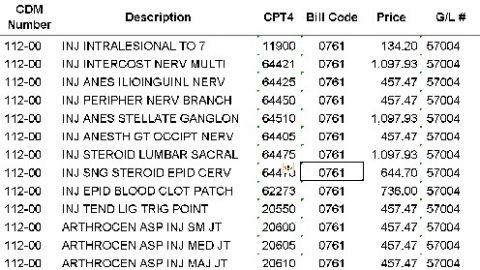What Is A Charge Master?
Posted by Mitch Mitchell on Nov 3, 2021
I've written about hospital charge masters in many of my articles on health care. I wrote a one paragraph explanation about charge masters years ago, but it's not close to being sufficient. This particular article on charge masters is actually a repurposed article that I wrote back in 2011, but search engines don't include older posts like this in their analytics. Since it's an important topic for health care professionals, and should be for everyone else, I'm updating this article, and then near the end I'll be including the video I did on the same subject in 2012 on YouTube... as it's the #1 video on the topic... I'm proud of that!

Charge master example
A charge master is a list of items that a hospital, physician, clinic or any other medical entity can or will charge you for. I word it that way because they "can" charge you for almost anything, though they shouldn't. On a hospital charge master, or CDM for short, you'll have procedures, supplies, pharmaceuticals and different types of room charges. Almost every item on a charge master is priced and coded to make charging and billing easier. Some hospitals or physicians will their CDM as a tracking device, which I don't advocate, but since those items aren't priced I feel if they're labeled properly then it's all good.
Why will medical entities have something like this? There are many reasons:
- It helps with capturing charges. People don't have to constantly research the code books and pricing list to see what they did and figure out how to charge for it.
- There are literally thousands of items that can "legitimately" be charged for. There are nearly 3,000 procedure codes, more than 10,000 different pharmaceuticals, and unlimited numbers of supply items. Medical providers only add the charges they'll actually bill for. Some physicians only have around 20 codes; some hospitals can have tens of thousands... though I try to reduce that amount when I'm in a consulting role.
- Each has a chance to clean up or modify what they do easier. With a list of charges and other such things they can have someone like me come in to help them figure out how to do it easier and better.
- It helps with billing. This is actually the biggie. With charges come charge codes, procedure codes, revenue codes, sometimes modifiers, general ledger codes, and descriptions. It's a bit much to have to go over on a daily basis.
Depending on the types of services a hospital provides, the CDM can be anywhere from 5,000 line items up to more than 25,000 line items; ouch! If a hospital never eliminates old procedures and supplies, it will definitely be huge. I love working on these things; maybe I'm the sick one. lol
If you're not in health care this is probably all you want to know about the technical part of it. You now want to know how all of this impacts you, the patient, and you, the provider of services; I'm here for you.
The reason consumers need to know about these things is because it gives you knowledge that if you call the hospital to ask how much something costs, there's a document, even if it's online, that can give the right person that amount so they can clue you in. True, you might have to call around until you reach someone who can help you with that information, but it's your right to find out.

Me, Charge Master Consultant
Truth be told, most hospitals don't have someone who's specifically over the charge master. This means that you can call to ask how much something is and you might get passed around from person to person. Many departments that provide services don't keep this on hand, though they should. Billing departments don't normally keep it on hand because the price of items has nothing to do with the billing process; yes, that's true. Many billing people don't have access to a charge master.
But you do; at least in some states. You can request an entire copy of the charge master, or you can at least see all the prices for whatever it is you need to have done. Surgery is kind of a red herring in that no hospital can definitely tell you how long a physician will need to perform surgery on you, and you don't want physicians rushing your surgery just to save you money. If you're told to estimate an hour and it takes two, just make sure all your parts are working when you get home and be happy with it. You never know what's going on during a surgery.
In some states hospitals are required to send charge masters to them for some type of review, like Pennsylvania as it concerns rehabilitation and physical therapy charges, which means you could get your information from the state. They're not happy about that though. Many hospitals will put their CDMs online, and some even hire a person to respond to all calls asking about pricing. This used to happen often, but most hospitals found that, though patients clamor to know the cost of services, almost no one ever calls hospitals to ask them the rates up front.
Even with all the outcry's about being overcharged many people don't check on price before they get procedures done. Having insurance mutes a lot of those worries, and knowing you have to have something done anyway scares a lot of people from wanting to know.
For providers of service, no matter which department or specialty you're in, this is why a charge master is important for you. Like most businesses, employees know what they know and that's pretty much it. Health care is no different. Billers know billing; technicians know how to use what they work with. Capturing charges... unfortunately that's more of a crap shoot half the time. If capturing charges is an inconsistent practice, think about the problems facilities might have if they pick charges that aren't coded properly... or don't have prices on them (which happens more often than you'd believe).
Charge masters or charge sheets help facilitate the process, but only if they've been priced and coded correctly... or don't have multiple of the same charges but only one of those codes is actually picked up in the computer system (yeah, that also happens often). That's why they're important... but also quite unknown by most people who work in health care.
I found out in two hospitals where I was an employee and at many more as a consultant that charge masters are an afterthought to pretty much everyone, if they'd actually ever heard the term, which is rare. That's why I specialize in it; I'm pretty good in working with them and with those who I help understand it better as it pertains to their departments.
The initial information about charge masters is easier to tell by sharing this video. It's not only the first video I did on my business YouTube channel, but it's the most viewed video on the subject on YouTube; yeah, I'm proud:
https://youtu.be/uoMkFoXcMwc
I hope I've given enough information to the layman about charge masters. There's lots of information on charge masters in varying degrees on this blog, and articles like this one, Importance of the Charge Capture/Revenue Review Process, on my website. Tooting my own horn; I'm pretty good at this! 🙂
If you have any questions for me I'm happy to answer them; that is, unless you're looking for CDM advice. Then I have to charge you; I am a consultant after all. 😉

